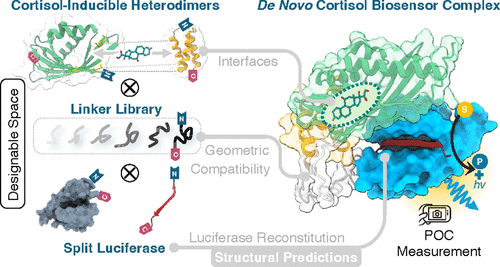At the University of California Santa Cruz, biomolecular engineer Andy Yeh has developed a luminescent biosensor that detects cortisol—the body’s primary stress hormone—with unprecedented sensitivity and dynamic range. Cortisol regulates blood pressure, metabolism, and immune response, and imbalances are linked to conditions like chronic fatigue, depression, and adrenal disorders. Traditional cortisol tests require lab equipment and offer limited accuracy outside normal ranges.
Yeh’s biosensor uses two artificially designed proteins that bind to cortisol and emit light when activated. The amount and color of light correlate directly with cortisol concentration. This signal can be captured using a smartphone camera, enabling point-of-care testing without expensive lab instrumentation. The biosensor works with blood or urine samples and requires only a drop of fluid mixed with a reagent—similar to rapid COVID-19 tests.
What sets this apart is its de novo protein design, guided entirely by AI. Unlike conventional biosensors that modify natural proteins, Yeh’s system was built from scratch to optimize performance. It covers the full spectrum of cortisol levels relevant to human health, offering quantitative results for low, normal, and high concentrations.
The technology could democratize stress monitoring, making it accessible for home use, rural clinics, and underserved populations. It also holds promise for drug development and personalized medicine, where precise hormone tracking is essential.
Article from UCSC: Artificial biosensor can better measure the body’s main stress hormone
Abstract in Journal of the American Chemical Society: De Novo Design of High-Performance Cortisol Luminescent Biosensors

